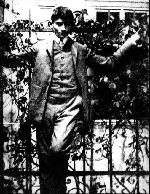Between 1901-1906, Franz Kafka attended the Prague German University, the German section of Charles University. In 1882, Charles University, which was divided into Czech and German sections, was situated in Karolinum in the Old Town. The entrance to the German university was in Železná St., while the Czech University was entered from Ovocný Trh. In addition, various university departments were scattered around the area. Kafka used to attend lectures at Klementinum, the complex of buildings of the farmer Jesuit college, or at the Clam-Gallas Palace in what is now Husova Street.
